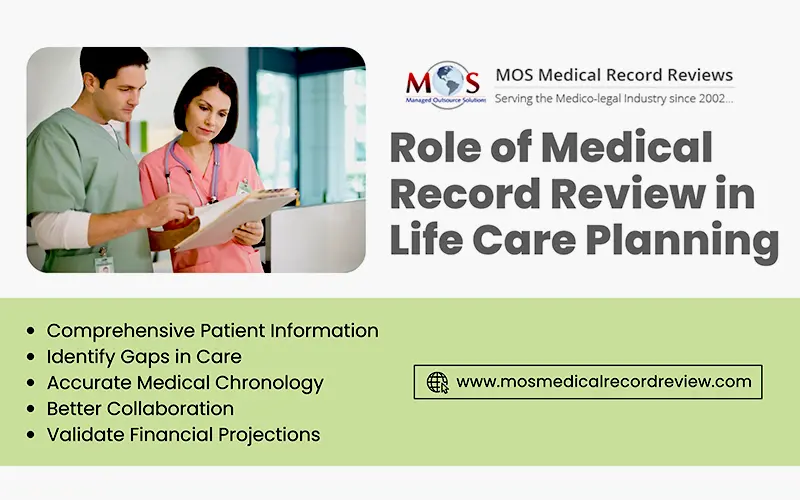Have you ever thought about how individuals with long-term disabilities or chronic conditions plan for their future healthcare needs? Life Care Planning (LCP) is an indispensable tool for such individuals to ensure they receive adequate care through a combination of medical expertise, financial planning and legal strategies. According to the International Association of Life Care Planners, life care plans can improve the quality of life for patients by anticipating and meeting their ongoing needs.
A vital aspect of every well-crafted life care plan is the diligent review of medical records. This post will explore the complexities involved in life care planning and how medical records play a crucial role in creating comprehensive chronologies.
What Is Life Care Planning?
Life care plan is a patient-focused projection of the medical care a patient may need (diagnostic testing, therapy, medical examinations, surgery, rehabilitation etc.) to address his/her health condition (disabilities, injuries or chronic health issues). It involves medical, legal and financial considerations to map the treatment and costs required.
Originally created for personal injury and workers’ compensation cases, life care plans have then expanded to accommodate patients and families in:
- Major injuries like traumatic brain injuries (TBIs) or injuries to the spine.
- Chronic illnesses that require continuous care.
- Pediatric conditions such as congenital heart disease.
- Old-age chronic conditions like dementia or mobility impairments.
A comprehensive life care plan essentially involves a collaboration between multiple professionals—doctors, nurses and financial advisors. Eventually, it was conceived to serve two critical purposes: ensuring the individual’s medical care is met promptly, and providing a transparent roadmap for cost forecasting in legal or insurance affairs.
What Is the Role of Medical Record Review in Life Care Planning?
Medical record review is the cornerstone upon which a life care plan is built. A well-documented review validates an individual’s medical history involving an accurate timeline of events, treatments and diagnosis, which helps them secure fair settlements. Here are a few reasons why:
- Evaluating the Patient’s Condition: Medical records provide a comprehensive report of the individual’s health, including the present status of the condition, its progression over time, treatment history, and any underlying complications. A proper record review ensures that life care planners suggest only appropriate and necessary interventions.
- Identifying Inconsistencies in Care: It is common for a detailed review report to reveal gaps or inconsistencies in care. This valuable information can help healthcare providers address inadequate needs, thereby improving the patient’s quality of care.
- Event Chronology: Chronology is an inevitable aspect for LCP. Sequentially arranging medical events in a timeline during review, provides insights into how the injuries or illnesses have evolved over time. This can prove to be vital for litigation cases, aiding attorneys in validating causation and damages.
- Improving Collaboration: In LCP, professionals coming from various fields/line of work collaborate together and they fully rely on medical records, as it ensures consistency during decision-making. Therefore, it is important to prepare a medical chronology that simplifies communication among different stakeholders.
- Supporting Cost Projections: Accurate cost forecasting lays a solid foundation for LCP. Therefore, record reviews justify the necessity of the said treatments, confirming the fact that costs are indeed reasonable and justifiable.
Challenges in Medical Record Review for Life Care Planning
Despite its advantages, medical record review can be challenging. Here are a few common roadblocks:
- Insufficient Records: Missing or incomplete documents can create gaps in the patient’s medical history.
- Complex Terminology: Medical jargon may be difficult for laymen to translate and it requires expertise.
- Volume of Information: Extensive and unorganized records can be exhausting and time-consuming.
These obstacles can be tackled by partnering with experienced medical record review firms that have a team of life care planners, trained to overcome these challenges and ensure their plans are built on solid platforms.
The MOS Advantage
Reviewing medical records is a meticulous task that requires precision, expertise, and a keen eye for detail. At Managed Outsource Solutions (MOS), we deliver expert services that can be customized to meet the varying client needs. Our experienced team comprises legal consultants and certified healthcare professionals with extensive experience in medical record analysis, ensuring accuracy and reliability.
Regardless of whether you require comprehensive chronologies or precise reviews for litigation, we provide flexible solutions and leverage the latest technologies guaranteeing speed with precision.
Final Thoughts
Life care planning is a critical process for individuals with long-term healthcare needs. At the heart of every successful plan lies a meticulous review of medical records, ensuring that the roadmap for care is accurate, evidence-based, and comprehensive. By addressing potential challenges and leveraging the expertise of skilled professionals, life care planners can make informed decisions that help improve the lives of their clients.
Disorganized Medical Records Derailing Life Care Planning?
Collaborate with us and bring your life care plan back on track!





